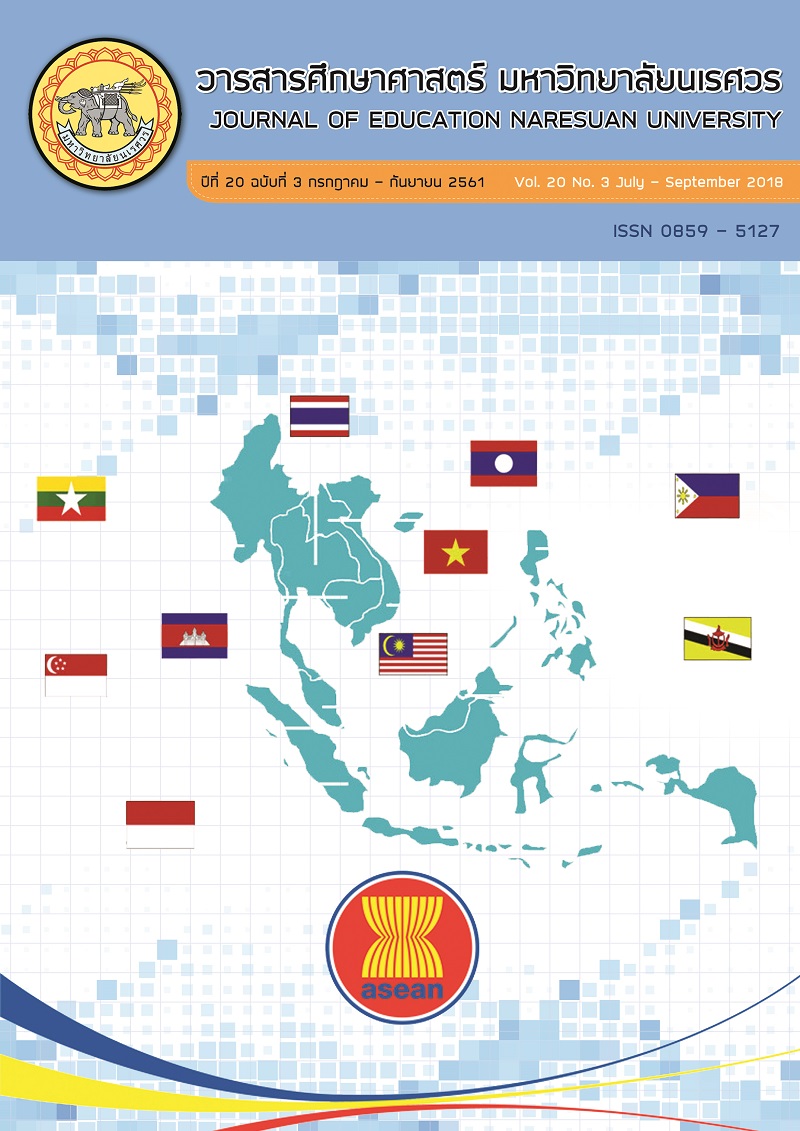การใช้รูปแบบการโต้แย้งทางวิทยาศาสตร์ภายใต้สมมติฐานทางเลือกเพื่อส่งเสริมความเข้าใจธรรมชาติของวิทยาศาสตร์ เรื่อง ของแข็ง ของเหลว และแก๊ส ของนักเรียนระดับชั้นมัธยมศึกษาตอนปลายในโรงเรียนวิทยาศาสตร์ภูมิภาค; IMPLEMENTATION OF AN INSTRUCTIONAL MODEL ON ...
Main Article Content
บทคัดย่อ
การวิจัยเชิงปฏิบัติการในชั้นเรียนครั้งนี้มีวัตถุประสงค์เพื่อศึกษาแนวทางการจัดการเรียนรู้ ตามรูปแบบการใช้การโต้แย้งเชิงวิทยาศาสตร์ภายใต้สมมติฐานทางเลือกเพื่อส่งเสริมความเข้าใจธรรมชาติของวิทยาศาสตร์ในเรื่องของเหลว ของแข็ง และแก๊ส ในระดับชั้นมัธยมศึกษาตอนปลาย และศึกษาระดับความเข้าใจธรรมชาติของวิทยาศาสตร์ของผู้เรียนหลังจัดการเรียนรู้ ซึ่งเป็นนักเรียนชั้นมัธยมศึกษาปีที่ 4 จำนวน 24 คน โดยการเลือกแบบเจาะจง ดำเนินการเก็บข้อมูลในภาคเรียนที่ 2 ปีการศึกษา 2558 โดยใช้ แบบบันทึกหลังสอน แบบวัดความเข้าใจธรรมชาติของวิทยาศาสตร์เรื่อง ของแข็ง ของเหลว และแก๊ส อนุทินสะท้อนความคิด ทำการวิเคราะห์ข้อมูลโดยการวิเคราะห์เนื้อหา ทำการแบ่งระดับความเข้าใจของผู้เรียนออกเป็น 4 กลุ่ม ดังนี้ เข้าใจเป็นอย่างดี เข้าใจเป็นบางส่วน เข้าใจคลาดเคลื่อน และไม่มีคำตอบ ผลวิจัย พบว่า จากการปฏิบัติครบวงรอบทั้ง 3 วงรอบสามารถสรุปแนวทางการจัดการเรียนรู้ตามรูปแบบการใช้การโต้แย้งเชิงวิทยาศาสตร์ภายใต้สมมติฐานทางเลือกได้และหลังจากจัดการเรียนรู้ผู้เรียนมีระดับความเข้าใจเกี่ยวกับธรรมชาติของวิทยาศาสตร์เพิ่มขึ้นทั้ง 3 ด้าน คือ โลกในมุมมองแบบวิทยาศาสตร์ การสืบเสาะหาความรู้แบบวิทยาศาสตร์ และกิจการทางวิทยาศาสตร์ โดยรูปแบบการใช้การโต้แย้งเชิงวิทยาศาสตร์ภายใต้สมมติฐานทางเลือกเป็นรูปแบบการจัดการเรียนรู้ที่กระตุ้นให้ผู้เรียนได้ทำงานร่วมกันเป็นกลุ่ม ส่งเสริมให้ผู้เรียนมีการสร้างองค์ความรู้ ความคิด มีกระบวนการสืบเสาะหาความรู้ และมีการแสดงบทบาทเช่นเดียวกับนักวิทยาศาสตร์ เป็นลักษณะกิจกรรมทางสังคมที่เกิดขึ้นภายในกลุ่มจึงเป็นการช่วยส่งเสริมความเข้าใจกระบวนการทำงานในบทบาทสังคมของนักวิทยาศาสตร์ส่งผลให้ผู้เรียนมีความเข้าใจในประเด็นธรรมชาติของวิทยาศาสตร์ได้ดียิ่งขึ้น
IMPLEMENTATION OF AN INSTRUCTIONAL MODEL ON SCIENTIFIC ARGUMENT ALTERNATIVE HYPOTHESIS TO ENHANCE HIGH SCHOOL STUDENTS’ UNDERSTANDING OF THE NATURE OF SCIENCE IN SOLID, LIQUID AND GASES TOPIC: A CASE OF REGIONAL SCIENCE SCHOOL
This classroom action research was aimed to study the teaching of the scientific argument evaluate alternatives instructional model and the result of the scientific argument evaluate alternatives instructional model to enhance high school students’ understanding of the nature of science in solid, liquid and gases topic: a case of regional science. The data were collected in the second semester of academic year 2015, using a measure of understanding of the nature of science, solids, liquids and gases, student journal writing and teacher reflective journals. Data were analyzed using content analysis. And the level of understanding of the students into four groups: Complete understanding, Partial understanding, mis understanding, and no answer. The researchers found that from the end of the third loop cycle that can be summarized the approach of scientific argument teaching. Moreover, after learning from that model the students have an understood about the nature of science all of three aspects increase: scientific world's view, scientific inquiry and scientific enterprise. The scientific argument evaluate alternatives instructional model that encourages students to work together as a group. Students were encouraged to create a body of knowledge that is the quest for knowledge and role, as well as scientists. Through practice the principles of the scientific knowledge. This is a social activity that takes place within the group, thus helping to promote understanding of the work process in the role of social scientists. The student understands the nature of scientific issues better.
Article Details
เจ้าของบทความมิได้คัดลอก หรือละเมิดลิขสิทธิ์ของผู้ใด หากเกิดการละเมิดลิขสิทธิ์ ไม่ว่าวิธีใด หรือการฟ้องร้องไม่ว่ากรณีใด ๆ ที่อาจเกิดขึ้นได้ กองบรรณาธิการวารสารศึกษาศาสตร์ ไม่มีส่วนเกี่ยวข้องทั้งสิ้น ให้เป็นสิทธิ์ของเจ้าของบทความที่จะดำเนินการ
เอกสารอ้างอิง
Duschl, R. A., Schweingruber, H. A., & Shouse, A. W. (2007). Taking science to school: Learning and teaching science in grades k-8. USA: National Academies Press.
Jumpamoon, W. (2012). The effect of teaching patterns on constructing arguments affecting science learning achievement and rational thinking skills of lower secondary school students (Master thesis). Bangkok: Chulalongkorn University. (in Thai)
Kaewhan, C. (2010). The result of understanding and teaching nature of science teachers' on the understanding of the nature of science for students Mathayom Suksa 1 in schools for expanding basic education opportunities (Master thesis). Phitsanulok: Naresuan University. (in Thai)
Kijkuakul, S. (2013). The nature of science and learning indicators (Part 2). Journal of Education Naresuan University, 15(2), 137-142. (in Thai)
Lederman, N. G., Abd-El-Khalick, F., Bell, R. L., & Schwartz, R. S. (2002). Views of nature of science questionnaire: toward and meaningful assessment of learners’ conceptions of nature of science. Journal of Science Teacher Education, 39(6), 447-521.
Limpanon, P. (2004). The study of the science teaching of the science for science teachers by science subject matter (Master thesis). Bangkok: Chulalongkorn University. (in Thai)
Wongthong, K. (2014). The effects of learning management based on science, technology and society concepts, and the visual teaching of the nature of science in nuclear physics for students in Mathayomsuksa 6 (Master thesis). Phitsanulok: Naresuan University. (in Thai)


